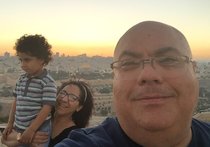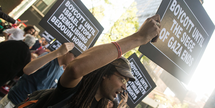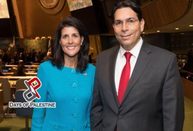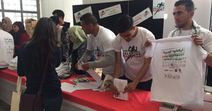12 apr 2017

Adam, Lina and Kamel Hawwash on a previous holiday in Jerusalem.
Israel has banned British-Palestinian professor and boycott campaigner Kamel Hawwash from visiting relatives in Jerusalem.
Hawwash told The Electronic Intifada he was “devastated.” Israeli authorities divided his family after they had flown into Tel Aviv on Friday.
An Israeli officer took him aside and told him, “we have a problem with you,” Hawwash said. The officer cited Hawwash’s support for boycott, divestment and sanctions against Israel, and a new Israeli law against the BDS movement.
The officer asked Hawwash, “Do you know about the BDS law?”
The new law gives Israel the ability to bar entry to anyone who speaks in favor of boycotts of Israel. It applies even to limited boycotts of Israeli settlements in the occupied West Bank, all of which are illegal under international law.
Hawwash’s wife and five-year-old son were allowed to enter, but he was denied entry and put on a plane to Brussels a few hours later. Hawwash had flown from Birmingham to Tel Aviv, via Brussels.
His passport was confiscated and given to the pilot.
“I went and told my wife I wasn’t going to be admitted, and she obviously broke down. My son was completely bewildered as to what was happening,” Hawwash said.
The family had been headed for Jerusalem for their annual holiday in Palestine, a tradition that now seems to be at a forcible end.
Hawwash says he does not engage in political work during his trips to the family’s homeland.
Family torn apart
While Hawwash’s wife Lina holds only the Israeli identification card issued to Palestinians in Jerusalem, Hawwash holds a British passport.
“I was never going to deny her the chance to see her family, so she went in,” Hawwash said.
“My mother-in-law – immediately when she heard – said to my wife, ‘oh my God, that means I’m never going to see Kamel before I die,’” said Hawwash. “And I have uncles who are in their seventies who could pass away any moment.”
Hawwash has long been a leading figure in the UK-based Palestine Solidarity Campaign and is a member of its executive committee. He is also an engineering professor at the University of Birmingham.
This was the first time has been denied entry, despite years of family visits.
The Israeli officer who questioned him accused him of belonging to an “anti-Israel organization,” said Hawwash.
“Really what hurts is seeing people who’ve taken our land stopping us from going back to it,” Hawwash told The Electronic Intifada. “The colonizer saying that you can’t come to your homeland.”
Scandalous British inaction
The Israeli officer gave Hawwash a Hebrew print-out, claiming it contained messages from his Twitter account. Hawwash replied that he would have to see the English originals before he could comment.
At the end of the questioning, he was handed a document citing Israeli law, barring his entry. The document is published below, with personal details redacted.
An article about Hawwash published by the Israeli settler news agency Arutz Sheva quotes Aryeh Deri, Israel’s interior minister, alleging there have been “attempts by those who act to boycott Israel to enter its borders and thus strengthen their operations.”
Hawwash called a British consulate, but the authorities were little help, telling him, “Well if you’ve been denied entry there’s nothing we can do.”
Richard Burden, a lawmaker representing Birmingham, is demanding the UK government speak out against the anti-boycott law, according to a statement issued by the Palestine Solidarity Campaign.
Burden said that it is “utterly shocking” Hawwash may never see his family in Palestine again due to the anti-BDS law.
“The relaxed attitude our ministers are showing to Israel’s actions is scandalous,” he added.
Undemocratic
Ben Jamal, director of the Palestine Solidarity Campaign, said in the statement: “The bottom line is that Israel is using its new boycott law to ban foreign human rights activists. The BDS movement peacefully pressures Israel to comply with international law and cease human rights violations.”
Hawwash’s parents were born in Jerusalem. But they were living in Saudi Arabia – where his father worked – during the war of June 1967. Israel’s military occupation of Jerusalem and the rest of the West Bank began during that war.
Like many other Palestinians who were outside the country at the time, Hawwash was denied a Jerusalem identity card.
On Monday, Israel barred Anuar Majluf, the director of the Palestinian Federation of Chile, as he traveled with a delegation to his ancestral homeland for Easter.
In March the Palestine Solidarity Campaign’s chair Hugh Lanning became the first known victim of the anti-BDS law, as Israel barred him from taking a four-day visit to occupied Jerusalem.
After the ban, Lanning, a former elected official in the UK’s Public and Commercial Services union, received messages of support from train drivers’ union ASLEF, the UK’s largest union Unite, as well as his own union.
Unite’s general secretary Len McCluskey said in a statement that “the new law to ban entry to foreigners who advocate the non-violent boycott, divestment and sanctions movement, violates fundamental freedoms which are essential to a democracy.”
He said that Israel was not behaving like a democratic country and called on the British government to protest against the new policy.
Israel has banned British-Palestinian professor and boycott campaigner Kamel Hawwash from visiting relatives in Jerusalem.
Hawwash told The Electronic Intifada he was “devastated.” Israeli authorities divided his family after they had flown into Tel Aviv on Friday.
An Israeli officer took him aside and told him, “we have a problem with you,” Hawwash said. The officer cited Hawwash’s support for boycott, divestment and sanctions against Israel, and a new Israeli law against the BDS movement.
The officer asked Hawwash, “Do you know about the BDS law?”
The new law gives Israel the ability to bar entry to anyone who speaks in favor of boycotts of Israel. It applies even to limited boycotts of Israeli settlements in the occupied West Bank, all of which are illegal under international law.
Hawwash’s wife and five-year-old son were allowed to enter, but he was denied entry and put on a plane to Brussels a few hours later. Hawwash had flown from Birmingham to Tel Aviv, via Brussels.
His passport was confiscated and given to the pilot.
“I went and told my wife I wasn’t going to be admitted, and she obviously broke down. My son was completely bewildered as to what was happening,” Hawwash said.
The family had been headed for Jerusalem for their annual holiday in Palestine, a tradition that now seems to be at a forcible end.
Hawwash says he does not engage in political work during his trips to the family’s homeland.
Family torn apart
While Hawwash’s wife Lina holds only the Israeli identification card issued to Palestinians in Jerusalem, Hawwash holds a British passport.
“I was never going to deny her the chance to see her family, so she went in,” Hawwash said.
“My mother-in-law – immediately when she heard – said to my wife, ‘oh my God, that means I’m never going to see Kamel before I die,’” said Hawwash. “And I have uncles who are in their seventies who could pass away any moment.”
Hawwash has long been a leading figure in the UK-based Palestine Solidarity Campaign and is a member of its executive committee. He is also an engineering professor at the University of Birmingham.
This was the first time has been denied entry, despite years of family visits.
The Israeli officer who questioned him accused him of belonging to an “anti-Israel organization,” said Hawwash.
“Really what hurts is seeing people who’ve taken our land stopping us from going back to it,” Hawwash told The Electronic Intifada. “The colonizer saying that you can’t come to your homeland.”
Scandalous British inaction
The Israeli officer gave Hawwash a Hebrew print-out, claiming it contained messages from his Twitter account. Hawwash replied that he would have to see the English originals before he could comment.
At the end of the questioning, he was handed a document citing Israeli law, barring his entry. The document is published below, with personal details redacted.
An article about Hawwash published by the Israeli settler news agency Arutz Sheva quotes Aryeh Deri, Israel’s interior minister, alleging there have been “attempts by those who act to boycott Israel to enter its borders and thus strengthen their operations.”
Hawwash called a British consulate, but the authorities were little help, telling him, “Well if you’ve been denied entry there’s nothing we can do.”
Richard Burden, a lawmaker representing Birmingham, is demanding the UK government speak out against the anti-boycott law, according to a statement issued by the Palestine Solidarity Campaign.
Burden said that it is “utterly shocking” Hawwash may never see his family in Palestine again due to the anti-BDS law.
“The relaxed attitude our ministers are showing to Israel’s actions is scandalous,” he added.
Undemocratic
Ben Jamal, director of the Palestine Solidarity Campaign, said in the statement: “The bottom line is that Israel is using its new boycott law to ban foreign human rights activists. The BDS movement peacefully pressures Israel to comply with international law and cease human rights violations.”
Hawwash’s parents were born in Jerusalem. But they were living in Saudi Arabia – where his father worked – during the war of June 1967. Israel’s military occupation of Jerusalem and the rest of the West Bank began during that war.
Like many other Palestinians who were outside the country at the time, Hawwash was denied a Jerusalem identity card.
On Monday, Israel barred Anuar Majluf, the director of the Palestinian Federation of Chile, as he traveled with a delegation to his ancestral homeland for Easter.
In March the Palestine Solidarity Campaign’s chair Hugh Lanning became the first known victim of the anti-BDS law, as Israel barred him from taking a four-day visit to occupied Jerusalem.
After the ban, Lanning, a former elected official in the UK’s Public and Commercial Services union, received messages of support from train drivers’ union ASLEF, the UK’s largest union Unite, as well as his own union.
Unite’s general secretary Len McCluskey said in a statement that “the new law to ban entry to foreigners who advocate the non-violent boycott, divestment and sanctions movement, violates fundamental freedoms which are essential to a democracy.”
He said that Israel was not behaving like a democratic country and called on the British government to protest against the new policy.
6 apr 2017

Organizers subsequently canceled the Kalamazoo Festival and promised to refund tickets.
On March 26, the Israeli Kalamazoo Festival announced that Destiny Frasqueri, also known as Princess Nokia, canceled her upcoming performance at the Haoman 17, a nightclub in Tel Aviv.
“Under extreme pressure from [the Boycott, Divestment and Sanctions (BDS) movement], Destiny decided to cancel her arrival in Israel. In recent weeks we have concentrated our efforts on trying to change her mind… but without much success,” a statement by the festival reads.
Festival officials also revealed that the entire event was canceled consequently and all tickets would be refunded. At least eight other musicians were scheduled to perform alongside Frasqueri at Kalamazoo.
Boycott from Within, a group of Israeli citizens who advocate for the Palestinian-led BDS movement, wrote to Frasqueri on Facebook in March:
“You are an artist dedicated to uplifting and empowering women, people of color, LGBTQ persons, and your work speaks volumes to the effort to dismantle white supremacy and misogyny. Please remember that among those are also Palestinians dying under Israeli apartheid, calling [on] you to stand in solidarity with them and boycott Israel. Please cancel your show.”
The group also responded to news of the cancellation:
“We would like to thank you for adopting a moral stance and [refusing] to take part in apartheid and discrimination against indigenous people by not performing in Israel… We hope to see more conscious artists like you take principled stances against oppression and injustices, and follow in your footsteps.”
The BDS movement is a global, non-violent, social justice movement that advocates boycotting, divesting from, and sanctioning Israel and the companies that do business with it until Israel complies with international law and respects Palestinian human rights.
An important facet of the BDS movement is its call for “international cultural organizations and workers to boycott and/or work towards the cancellation of events, activities, agreements, or projects involving Israel, its lobby groups or its cultural institutions.” The approach is meant to challenge the way in which Israel uses culture as a form of propaganda to whitewash or justify the occupation.
On March 26, the Israeli Kalamazoo Festival announced that Destiny Frasqueri, also known as Princess Nokia, canceled her upcoming performance at the Haoman 17, a nightclub in Tel Aviv.
“Under extreme pressure from [the Boycott, Divestment and Sanctions (BDS) movement], Destiny decided to cancel her arrival in Israel. In recent weeks we have concentrated our efforts on trying to change her mind… but without much success,” a statement by the festival reads.
Festival officials also revealed that the entire event was canceled consequently and all tickets would be refunded. At least eight other musicians were scheduled to perform alongside Frasqueri at Kalamazoo.
Boycott from Within, a group of Israeli citizens who advocate for the Palestinian-led BDS movement, wrote to Frasqueri on Facebook in March:
“You are an artist dedicated to uplifting and empowering women, people of color, LGBTQ persons, and your work speaks volumes to the effort to dismantle white supremacy and misogyny. Please remember that among those are also Palestinians dying under Israeli apartheid, calling [on] you to stand in solidarity with them and boycott Israel. Please cancel your show.”
The group also responded to news of the cancellation:
“We would like to thank you for adopting a moral stance and [refusing] to take part in apartheid and discrimination against indigenous people by not performing in Israel… We hope to see more conscious artists like you take principled stances against oppression and injustices, and follow in your footsteps.”
The BDS movement is a global, non-violent, social justice movement that advocates boycotting, divesting from, and sanctioning Israel and the companies that do business with it until Israel complies with international law and respects Palestinian human rights.
An important facet of the BDS movement is its call for “international cultural organizations and workers to boycott and/or work towards the cancellation of events, activities, agreements, or projects involving Israel, its lobby groups or its cultural institutions.” The approach is meant to challenge the way in which Israel uses culture as a form of propaganda to whitewash or justify the occupation.
31 mar 2017

Israeli Ambassador to the UN, Danny Danon, said on Wednesday that Israel would “keep fighting” until it “eliminates BDS completely.”
“There is a new approach [to fight BDS] and it is being heard in the halls of the UN Indeed,” Danon told 2,000 attendees at a pro-Israel UN event, according to Days of Palestine.
“We have seen a lot of legislation since the first conference; 17 states have enacted anti-BDS legislation and we are seeing more groups fighting back against BDS,” he added.
Danon’s remarks echoed stronger remarks about the issue by US Ambassador to the UN, Nikki Haley.
Haley said at the same event: “The effort to delegitimize the state of Israel being waged on college campuses and the anti-Israel obsession at the UN are one in the same. They both seek to deny Israel’s right to exist.”
She continued: “They are both efforts to intimidate US friends and embolden her enemies. They are both extensions of an ancient hatred”.
The ambassador added: “And how tragic is it that of all countries in the world to condemn for human rights violations, these voices choose to single out Israel.
“We should boycott North Korea. We should sanction Iran. We should divest from Syria. Not Israel. It makes absolutely no sense. And it has no connection to any reasonable definition of justice. You can let the BDS know that the United States has Israel’s back.”
“There is a new approach [to fight BDS] and it is being heard in the halls of the UN Indeed,” Danon told 2,000 attendees at a pro-Israel UN event, according to Days of Palestine.
“We have seen a lot of legislation since the first conference; 17 states have enacted anti-BDS legislation and we are seeing more groups fighting back against BDS,” he added.
Danon’s remarks echoed stronger remarks about the issue by US Ambassador to the UN, Nikki Haley.
Haley said at the same event: “The effort to delegitimize the state of Israel being waged on college campuses and the anti-Israel obsession at the UN are one in the same. They both seek to deny Israel’s right to exist.”
She continued: “They are both efforts to intimidate US friends and embolden her enemies. They are both extensions of an ancient hatred”.
The ambassador added: “And how tragic is it that of all countries in the world to condemn for human rights violations, these voices choose to single out Israel.
“We should boycott North Korea. We should sanction Iran. We should divest from Syria. Not Israel. It makes absolutely no sense. And it has no connection to any reasonable definition of justice. You can let the BDS know that the United States has Israel’s back.”

Last week, the Doctors’ Syndicate in Beirut decided to end its relationship with G4S, one of the world’s largest multinational security companies, following a campaign by activists in Lebanon concerned with the company’s ongoing complicity with Israeli violations of Palestinian human rights.
The “Lebanese Campaign to Boycott the Supporters of Israel” has announced that the decision by the Syndicate to not renew its contracts with G4S is an important milestone in the global campaign against the company. The group noted that several other institutions, including the Arab Bank, UNICEF and the Dunes Complex, in the Verdun neighborhood of Beirut, have also distanced themselves from G4S over the past few months.
The global campaign against G4S was launched in 2012, after a call by Palestinian political prisoners to boycott the company over its role at the time in providing equipment and services to Israeli prisons, where Palestinian political prisoners are routinely held without trial and subjected to torture and ill-treatment. G4S has also been involved in servicing Israeli military checkpoints and illegal settlements built on stolen Palestinian land.
Under strong pressure from BDS activists participating in the international Stop G4S campaign, G4S has, for the last several years, been losing major deals and investments around the world. In 2016, the company was forced to sell most of its business in Israel, but still services the Israeli Police Academy and invests in the Shikun & Binui group which builds illegal settlements. As such, G4S remains complicit in Israeli violations of Palestinian human rights, and will continue to be a BDS target due to its persisting complicity.
The Palestinian Boycott, Divestment and Sanctions National Committee (BNC), the largest coalition in Palestinian civil society and the leadership of the global BDS movement, welcomed this victory and saluted the efforts of activists in Lebanon. The BNC further confirms that the campaign against G4S will continue, both regionally and globally, until G4S completely ends its complicity in Israel’s regime of apartheid, military occupation and settler-colonialism.
The “Lebanese Campaign to Boycott the Supporters of Israel” has announced that the decision by the Syndicate to not renew its contracts with G4S is an important milestone in the global campaign against the company. The group noted that several other institutions, including the Arab Bank, UNICEF and the Dunes Complex, in the Verdun neighborhood of Beirut, have also distanced themselves from G4S over the past few months.
The global campaign against G4S was launched in 2012, after a call by Palestinian political prisoners to boycott the company over its role at the time in providing equipment and services to Israeli prisons, where Palestinian political prisoners are routinely held without trial and subjected to torture and ill-treatment. G4S has also been involved in servicing Israeli military checkpoints and illegal settlements built on stolen Palestinian land.
Under strong pressure from BDS activists participating in the international Stop G4S campaign, G4S has, for the last several years, been losing major deals and investments around the world. In 2016, the company was forced to sell most of its business in Israel, but still services the Israeli Police Academy and invests in the Shikun & Binui group which builds illegal settlements. As such, G4S remains complicit in Israeli violations of Palestinian human rights, and will continue to be a BDS target due to its persisting complicity.
The Palestinian Boycott, Divestment and Sanctions National Committee (BNC), the largest coalition in Palestinian civil society and the leadership of the global BDS movement, welcomed this victory and saluted the efforts of activists in Lebanon. The BNC further confirms that the campaign against G4S will continue, both regionally and globally, until G4S completely ends its complicity in Israel’s regime of apartheid, military occupation and settler-colonialism.
